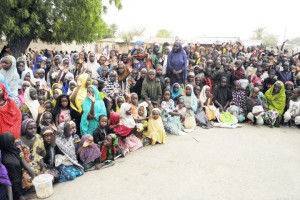According to him, 14 health officials posted in each of the camps would provide health care services like routine immunisation against preventable diseases for children aged zero to 11 months. He said that the gesture was to enhance healthy growth of the children in the area of nutrition as well as malaria and tuberculosis prevention. Mene listed other services enjoyed by the IDPs to include anti-natal health care to pregnant women, psycho-social services as well as child nutrition support for mothers. He said the board, through its Community Management of Malnutrition Team (CMMT), had ensured frequent provision of clean and potable water in the camps.
According to him, the team was set up by the agency’s department of Disease and Control. The executive secretary mentioned some of the challenges faced by the agency to include increasing number of IDPs coming to the camps on a daily basis from the liberated towns. He regretted that the camps were over-stretched, but that the agency was working with partners like NEMA, WHO, UNDP, Doctors without Borders and UNICEF, among others, to provide conducive, healthy and hygienic environment for the IDPs.
Source: Leadership Online

 The Borno Primary Health Care Management Board (BPHCM) says no fewer than 190,000 Internally Displaced Persons (IDPs) in 28 camps in the state had benefitted from its free medical outreach. The Executive Secretary of the Board, Dr Sule Mene,
The Borno Primary Health Care Management Board (BPHCM) says no fewer than 190,000 Internally Displaced Persons (IDPs) in 28 camps in the state had benefitted from its free medical outreach. The Executive Secretary of the Board, Dr Sule Mene,




